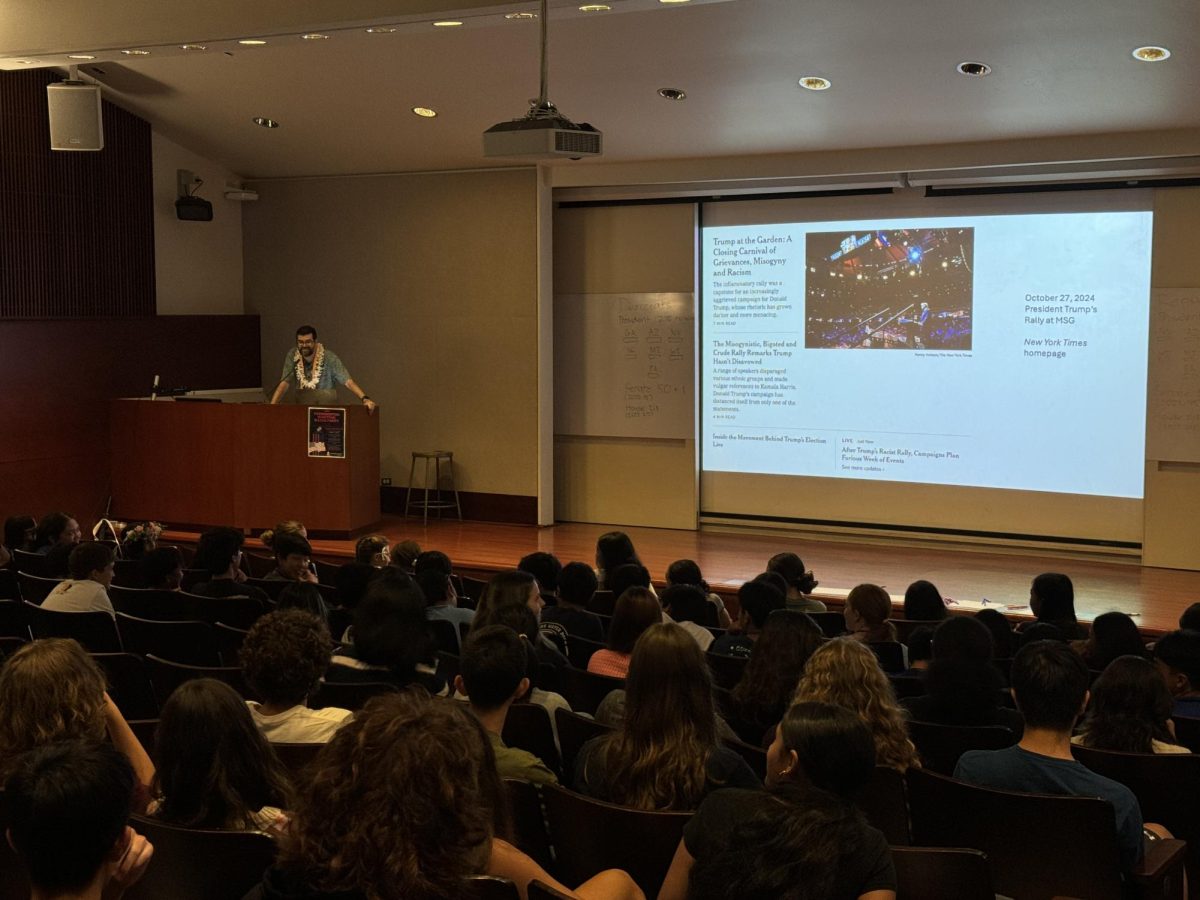On November 5th, the Davis Democracy Initiative (DDI) hosted a presidential election watch party. Members of the initiative helped organize this event at Luke Lecture Hall with substantial support from Dr. David Ball and Dr. Pamela Sakamoto.
Students from the DDI club voiced their support for this event: “It is so great to see students, to see young people, to be civically engaged at such an important day in American history,” stated Perry Dye ‘25.
In the weeks leading up to the watch party, Fellows contacted English and social studies classes from Case Middle School and the Academy. Additionally, students and faculty were invited to speak on related issues they were passionate about. Although political elections can be quite polarizing, organizers believed it was important for this watch party to remain non-partisan. The Davis Democracy Initiative prioritizes effective, educational discussions, and by not affiliating with a certain party, Dr. Ball and Democracy Fellows hoped to maintain a welcoming atmosphere.
Dr. Ball, one of the DDI’s program coordinators, commented, “It’s really just a day to practice civics… the more we practice, the better we get at it.”
Instead of promoting one party’s ideals over the other, many in the Punahou community thought it was essential to keep an open mind throughout the election. Moreover, by listening to differing opinions, a wider range of perspectives can be shared. This is one reason why DD Fellows such as Pomai Chang ‘25 wanted to take charge in organizing this event: “Despite the contentious nature of the election, I find it enjoyable to host an event where people can share their opposing views in a safe and intellectual environment,” Chang stated.
Presidential elections typically last the entire day due to ballot counting schedules differing across time zones. In Hawai’i Standard Time, most results were released in the late afternoon. However, civic activities, engaging presentations, and thoughtful discussions kept students occupied throughout the event.
The watch party started at 8 AM, but Luke Lecture Hall became more populated around 8:15 AM. Chang projected CNN and Fox News’ live election coverage on the screen. Both stations delved deeply into congressional districts in “battleground states,” such as Georgia and Michigan, comparing recent polls to voting data from the 2020 election.
At around 9 AM, eighth-grade students from Ms. Carey Robinson’s social studies class visited to discuss the Electoral College. The middle school students then broke out into group discussions led by high school students. The eighth graders recently learned about the Electoral College in class, and they were very interested to see how the system worked in real life. Later in the morning, Academy students were joined by Ms. Rachel Navarro and Mrs. Christinia Cawdery’s freshmen GSD class. Attendees continued to tune into live news coverage.
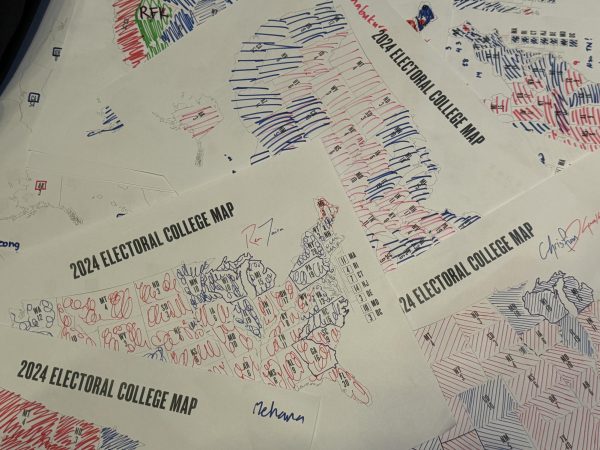
Toward the beginning of lunch, Chang ‘25 led an interactive activity where students predicted the election outcome by coloring electoral maps. These maps contained an outline of each state and the number of electoral votes they held. Students could color using red, blue, and green to designate their predicted voting outcome for each state.
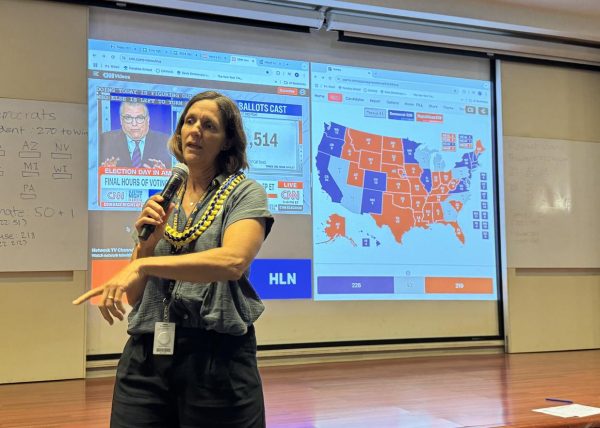
Meanwhile, Dr. Debbie Milikan, the first speaker, delivered an presentation on climate policy. She outlined three specific points in her speech. The first point she emphasized was the importance of researching candidates using reliable sources. In this election, the two candidates had opposing views on climate justice; thus, she argued that it is crucial to educate yourself about candidates and their plans to address the issues you care about. Dr. Millikan additionally wanted to remind the audience that supporting local climate policy is critical. Although federal action can be effective, local-level policies are incredibly influential as well. For example, Hawai’i has taken many state-level actions to reduce its carbon footprint. Lastly, Dr. Millikan addressed youth engagement and the youth’s ability to create monumental change.
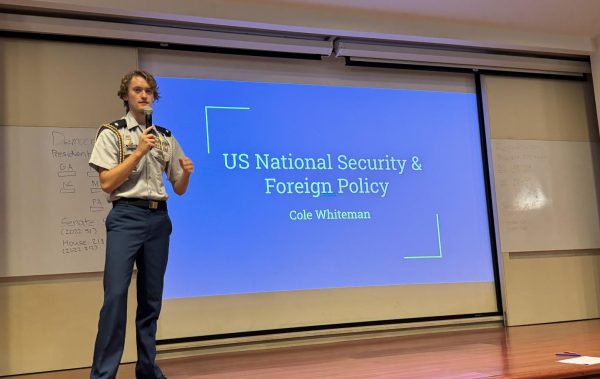
Dr. Millikan’s speech was followed by a student introduction to national security and foreign policy. Cole Whiteman ‘25, headed this presentation while students from both the Academy and middle school intently listened and asked questions. He narrowed in on a few topics; parallels between the candidates, the Russo-Ukrainian War, defense spending, and nuclear warfare were the most prevalent topics throughout his presentation.
After a short lunch break, Sophia Howell ‘26, Lulu Cole ‘27, and Kahn Ho ‘25 spoke about their work with Kids Voting Hawai’i. As many Academy students have experienced in their classes, KVH has been conducting mock elections with high school students all around the islands. They hope to expand civic engagement and promote democratic practices with younger generations.
Subsequently, Dr. Bonnie Christensen, who teaches Academy classes such as AP US History, AP European History, and AP US Government, shared information about campaign financing and Citizens United.
Following this, Dr. Steven Norper, a former global affairs innovator at EastWest Institute, spoke about global reactions to this election. As many know, the United States has a profound impact on foreign politics as a whole. Thus, many students were intrigued to learn more about the opinions the 2024 election generated around the world.
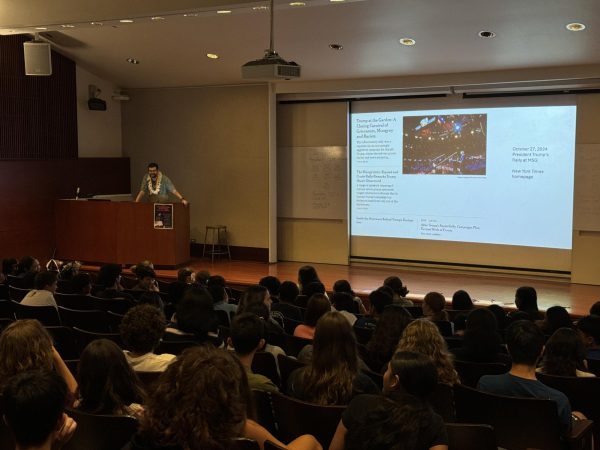
At around 2 PM, Dr. Ball spoke about media bias in the election process. At this point, numerous seventh-grade classes and Academy European History students had gathered at Luke Lecture Hall. Many other Academy students were present as well; seats were filled and many began to line up by the walls. Throughout his slideshow presentation, many curious middle school students asked questions, sparking discussion amongst the audience members. Dr. Ball also recalled specific events during the presidential campaigns and signified the importance of learning about these events through multiple sources, which can reduce the possibility of viewing them through biased lenses.
Although this event largely focused on the presidential race, many seats in the Senate and the House of Representatives were being contested simultaneously. Pomai Chang ‘25 led a discussion about the current standings of congressional candidates and thoroughly explained how the system differed from the presidential election system. He projected a live electoral map on the screen, describing patterns in states such as Florida and West Virginia. Chang also posited his predictions; many attendees were fascinated to hear about the importance of congressional races and their implications in government policy.
At 4 PM, President Mike Latham expanded on the Electoral College. He specifically acknowledged the system’s historical significance, controversies, and potential alternatives. He also raised the question: “What could be done to change it?” Students responded with innovative solutions and opinions on the contentious system. Dr. Latham also briefly mentioned past elections and possible outcomes for this one.
By this point, many states on the East Coast and Midwest were releasing their ballot results. For the majority of the time remaining, students paid close attention to the live news coverage of election results. They also compared their predictions with the released information, altering some guesses.
While the election results were not immediately announced at the end of the party, many students left excited yet anxious about who America’s 47th president would be.

